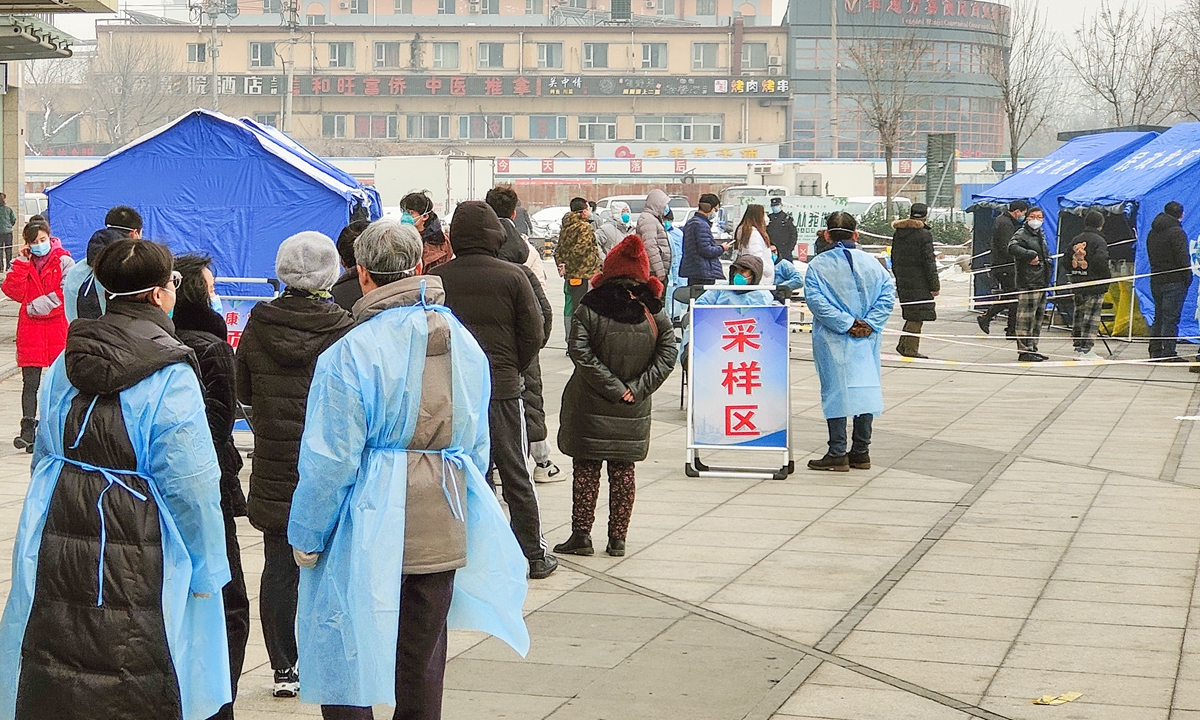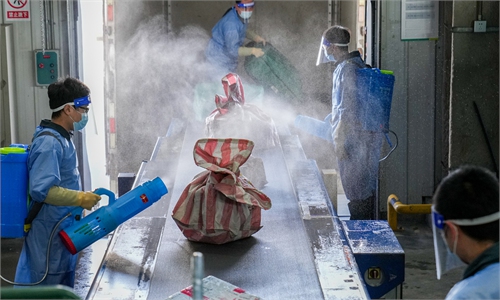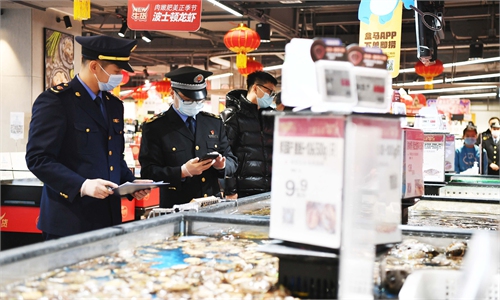Beijing conducts wider mass testing amid flare-up linked to cold-chain facilities
City launches 1st mass testing in Fengtai district

Residents in Fengtai district, Beijing line up to take nucleic acid tests on January 23, 2022. Photo: cnsphoto
Beijing beefed up anti-epidemic measures through wider mass testing, imposing travel restrictions for people in COVID-19 risk areas and requiring residents to take nucleic acid tests for purchasing medicines to cure fever, cough and others after the city reported nine new local infections on Sunday and registered a total of 43 cases during the past week.The COVID-19 situation in Beijing now is "severe and complex," Xu Hejian, spokesperson for the Beijing Municipal government, said at a Sunday news conference.
Starting on Sunday, residents who purchased medicines related to fever, cough, infections and dry pharyngeal pain within the past 14 days or in the future have to take a nucleic acid test within 72 hours, said Li Ang, deputy director of the Beijing Municipal Health Commission at the conference.
Beijing requires people in COVID-19 risk areas not to leave Beijing in principle. The city now has two COVID-19 medium-risk regions, including one newly added on Sunday, and one high-risk region, all in Fengtai district.
An outbreak connected to cold-chain facilities in Fengtai district has spilled over to at least three cities of two provinces - two cases in Jinan and Liaocheng, East China's Shandong Province and one in Datong city of North China's Shanxi Province. All the cases were either cold storage workers in Beijing or close contacts of infected workers.
Fengtai district rolled out mass nucleic acid testing with more than 1,000 testing spots in the early morning on Sunday, which is expected to be finished by the end of the day. It is the first administrative region to conduct mass testing during the current outbreak in Beijing.
A Fengtai resident, surnamed Liu, told the Global Times that the large-scale testing was "well-planned" with the community and street workers setting up tents and equipment for the mass testing on early Saturday night.
Other districts in Beijing, such as Chaoyang, Xicheng and Dongcheng - where only one or no infections were found - also started mass testing in some residential communities, the Global Times learned on Sunday.
The current epidemic prevention and control work in the city is difficult, as the intergenerational transmission time of the Omicron variant is short and the low temperature in winter increases the difficulty, Wang Guangfa, a respiratory disease expert at Peking University First Hospital, told the Global Times on Sunday.
Measures that the capital city is taking are part of a set of mature and standardized epidemic prevention and control system in Beijing, said Wang.
He said that it showed the enhanced efforts to contain epidemic flare-ups and create a good atmosphere for hosting the Winter Olympics. But the outbreaks will not affect the Games as long as the city continues to take effective measures.
Beijing anti-epidemic authorities have been on high alert since the latest sporadic outbreaks occurred.
An official from the Beijing Center for Disease Control and Prevention (Beijing CDC) told the Global Times recently that like many of his co-workers, CDC staff members have been working day and night on epidemiological investigations, tracing the transmission routes and notifying community workers to track down high- and medium-risk groups.
"Some of them only slept three or four hours and have not gone back home for a long time," he said, noting that it's indeed a time when nobody dares to lose ground as the city is on high alert in fending off further resurgence.
The Global Times learned from a designated quarantine hotel in Chaoyang district that the number of people quarantined has been recently surging, after one asymptomatic case was reported in the district. Those who have been put into collective quarantine have to go through nucleic acid tests one time per day or twice in three days, and body temperature checks twice per day are required.



